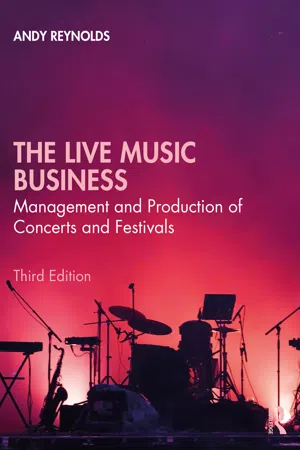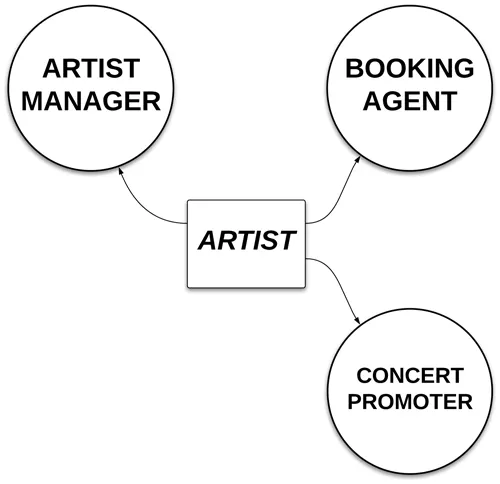
The Live Music Business
Management and Production of Concerts and Festivals
- 316 pages
- English
- ePUB (mobile friendly)
- Available on iOS & Android
About this book
The Live Music Business: Management and Production of Concerts and Festivals, Third Edition, shines a light on the enigmatic live music business, offering a wealth of inside advice and trade secrets to artists and bands looking to make a living in the industry. Previously published as The Tour Book, this new edition has been extensively revised, reorganized, and updated to reflect today's music industry.
This practical guidebook examines the roles of the key players – from booking agents to concert promoters, artist managers to talent buyers – and the deals, conventions, and processes that drive this global business. Written by a touring professional with over 25 years of experience, this book elucidates why playing live is crucial to the success of any musician, band, or artist, explaining issues like:
- what managers, promoters, and agents do and how they arrange shows and tours;
- how to understand and negotiate show contracts;
- how to create a contract rider, and how the rider affects the money you earn from a show;
- how to appear professional and knowledgeable in an industry with its own conventions, language, and baffling technical terms; and
- a three-year plan using live performance to kickstart your music career
Intended for music artists and students, The Live Music Business presents proven live-music career strategies, covering every aspect of putting on a live show, from rehearsing and soundchecks to promotions, marketing, and contracts. In an era when performing live is more essential than ever, this is the go-to guidebook for getting your show on the road and making a living from music.
Frequently asked questions
- Essential is ideal for learners and professionals who enjoy exploring a wide range of subjects. Access the Essential Library with 800,000+ trusted titles and best-sellers across business, personal growth, and the humanities. Includes unlimited reading time and Standard Read Aloud voice.
- Complete: Perfect for advanced learners and researchers needing full, unrestricted access. Unlock 1.4M+ books across hundreds of subjects, including academic and specialized titles. The Complete Plan also includes advanced features like Premium Read Aloud and Research Assistant.
Please note we cannot support devices running on iOS 13 and Android 7 or earlier. Learn more about using the app.
Information
Part One
Live Music Management

NOTES
- PricewaterhouseCoopers, 2019. Global Entertainment & Media Outlook 2019–2023 – Getting Personal: Putting the Me in Entertainment and Media. PwC. URL https://www.pwc.com/gx/en/entertainment-media/outlook-2019/entertainment-and-media-outlook-perspectives-2019-2023.pdf (accessed 11.11.19). https://www.pwc.com/gx/en/industries/tmt/media/outlook.html.
- Pollstar 2019 Year End Special [WWW Document], n.d. URL https://www.pollstar.com/specialedition/pollstar-2019-year-end-special-142982 (accessed 9.29.20).
- Concert promoter is the more common term used to describe talent buyers and one used from now on in this text.
Chapter 1 The Artists
Table of contents
- Cover Page
- Half Title Page
- Title Page
- Copyright Page
- Dedication
- Contents
- Figures and Tables
- Acknowledgements
- Introduction
- Part One Live Music Management
- Part Two Live Music Production
- Appendix 1: Concert Production Personnel
- 22 Appendix 2: A Performance Contract
- 23 Appendix 3: Contract Rider
- 24 Appendix 4: Tour Budget Sheet
- 25 Appendix 5: Day-to-Day Schedules
- Index